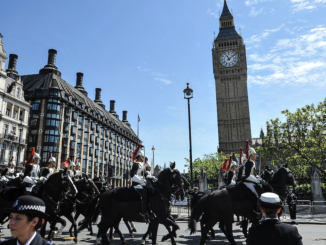
Lucky Jim was (Sir) Kingsley Amis’s first novel published in 1954. It is the funniest novel that I have read I think, and contains many genuinely laugh out loud passages.
Amis was inspired to write the book when visiting his best friend, Philip Larkin, when the latter was working as a librarian at the University of Leicester. Larkin had had to leave Amis in the staff common room while he attended to something. Amis seems to have been equally horrified and fascinated by what he witnessed of the academic staff at the university: the pretentiousness, the puffed-up self-importance, and the inconsequentiality of everything about the second or third tier English academic world, and resolved that somebody should write about it. He was thus motivated to start a novel which would eventually become Lucky Jim. (Amis was employed as a lecturer in English literature by the University of Swansea in the early fifties, and I’m curious as to what Amis witnessed at Leicester which so appalled him compared to his experiences of everyday life in Swansea).
Amis’s portrayal of post-war English academic life is savage. Our hero, Jim Dixon, is a young probationary lecturer in the unnamed provincial university’s history department. Dixon’s boss, Professor Welch, is portrayed as a buffoon, and his family are alarmingly snobbish and unpleasant. Due to Dixon’s precarious employment situation, and in an attempt to curry favour with his boss, Dixon is coerced into attending a musical recital at Welch’s house over a precious free weekend, where he makes a fool of himself on at least three occasions. No, four, there’s the morning after. Amis’s description of a young man getting steadily and pleasantly intoxicated during a pub lock-in, the resulting mayhem back at Welch’s house where he is staying the night, together with the description of wretched crapulence the following morning is a wonder.
Throughout the novel, Dixon has a habit of pulling funny faces, usually to caricature an adversary behind their backs. Amis himself was impressed that a critic hypothesised that Dixon’s face pulling was the behaviour of a combatant deep in enemy territory without effective allies: that seems to sum up Dixon’s situation pretty much perfectly. Amis had never consciously made that connection.
Dixon is also strongarmed by Welch into giving an end of term lecture on the fatuous theme of “Merrie England”, with Dixon being given the impression that securing his future employment depends on the successful delivery of said lecture. Just in case you haven’t read Lucky Jim I’ll say little more about specifics of the plot, but I will say that I have read the book five or six times since I bought it in 1993, and it has always cheered me up if I’m feeling browned off.
There are some interesting subplots in the novel, including Dixon’s unenthusiastic courting of his narcissistic on-off girlfriend Margaret, his rather more enthusiastic courting of Christine, a stunning blonde up from London who also happens to be Welch’s vile son Bertrand’s beau, and the first of various appearances in Amis’s novels of “L.S. Caton” (as in “lazy sod”), an evasive and deceitful character eventually killed off, to Amis’s deep satisfaction no doubt, in his 1966 novel The Anti-Death League. Caton was named after Amis’s first literary publisher R.A. Caton: the portrayal of this character appears to have been an exquisitely calculated insult.
The consensus is that Lucky Jim is Amis’s finest novel. In some ways that is a bit of a shame, as it was his first, and it is notable that Amis worked closely with Larkin on the text, taking on board many of Larkin’s suggestions. Alas, they never collaborated to such an extent again. The interweaving of the various plots, the climax, and its messy aftermath are perfectly paced and described.
Larkin and Amis were best friends. It is remarkable (not ironic: I think that Amis would not approve of the use of that word in this context) that, very early on in their careers, Larkin was judged to be the more promising novelist and Amis the more promising poet. That the two 1940s Oxford undergraduates, best buddies, enthusiastic boozers and jazz enthusiasts would become literary giants in their respective fields is something to marvel at.
Amis was irritated by the austerity of wartime Oxford, and then later, the stifling conformity and his perceived unfairness of army life (where he served as a lieutenant in the Royal Corps of Signals). He was a member of the Communist Party of Great Britain during the 1940s and into the 1950s. By the time of his death in 1995, he was widely considered as being a reactionary, and definitely of the right. (How this transformation came about cannot be summarised briefly). However, he never lost his nonconformity, and he delighted at the irritation with which the literary establishment viewed him. For example, between 1984-85 he reproduced a poem of the English literary tradition with his commentary in a daily column in the Daily Mirror, The Pleasure of Poetry – how dare those plebs be introduced to high culture! He also dipped into “low” culture. Some examples: he an wrote episode of the TV detective series Softly, Softly: Task Force, authored a James Bond novel, Colonel Sun, and wrote some very good short stories, some of which showcased his enthusiasm for science fiction, of which he was an accomplished critic (see New Maps of Hell). However, if there is a single opus for which Amis’s forty odd year career will be remembered, it will be Lucky Jim, I think. Rest in peace, Kingers.
© Quiller 2024



